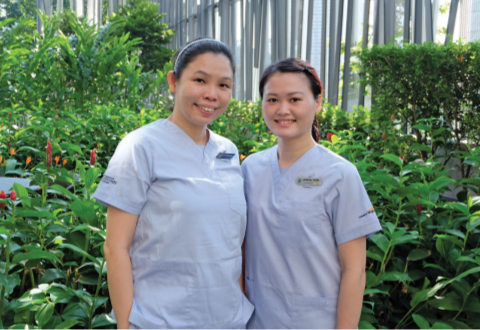
Principal Physiotherapist Ms Low Wai Yan and senior physiotherapist Ms Katherin Huang and Ms Low Wai Yan share with us about their work for pre and post- transplant patients.
What is the analogy you will give that sums up what you do?
W: We are the advocates for physical activities and the closest analogy that I can draw would be in the context of a kitchen. While transplant surgeons are the master chefs who are responsible in ensuring that the dish is cooked successfully, allied health professionals like dietitians, pharmacists and physiotherapists are the kitchen assistants who make sure that ingredients are well prepared and ready for cooking. In a gist, we are part of a team that helps to make transplantation surgery a success.
When is the involvement of the Physiotherapist before and after transplantation?
K: Transplant patients could be referred for physiotherapy during the pre- and post-transplant period. Upon referral, we would educate, assess, communicate and support all patients respectively.
W: Simple tasks such as sitting up could be a tall order for some of our end-stage organ failure patients before transplant. They are often very sick and physically inactive and therefore it is important for them to be optimized before the surgery to achieve better and faster recovery after transplantation.
Patient undergoes thorough evaluative procedures such as functional ability tests to access their physical abilities so as to tailor physiotherapy session accordingly. For instance, kidney failure patients are at a higher risk of developing osteoporosis because of their vitamin D deficiency and therefore weight bearing exercises are necessary to build and maintain their bone densities.
During their recovery phase after transplantation surgery, we continue to support and work closely with the patients to speed up their recovery. As physiotherapist, we would also prescribe tailored exercise regimens to patients prior to their discharge. While majority of transplant patients are motivated and see physiotherapy as part of the post-ops care required for their "new" organs, we do have patients who require encouragements and reinforcements to keep up their physical levels.
What are the main problems that our patients face after transplant?
K: Massive weight gain and osteoporosis are the two major challenges faced by transplant patients. General improvement in their well-being, long term use of immunosuppressive drugs and low level of physical activities are some of the common contributory factors to the massive weight gain.
W: Interestingly, being overprotective of the "new" organ could also contribute to the weight gain. Some patients are concerned about the risk of contracting infection when they go out, because of their immunocompromised state, which in turn results in reduced physical activities. We would address their concern accordingly and incorporate more domestic exercises into their regimen so as to maintain their endurance and strength.
Things that put a smile on your face
K: A simple thank you is all it takes to fuel us.
W: The gradual change in patients' attitude towards each session motivates me.
Contributed by














 Get it on Google Play
Get it on Google Play